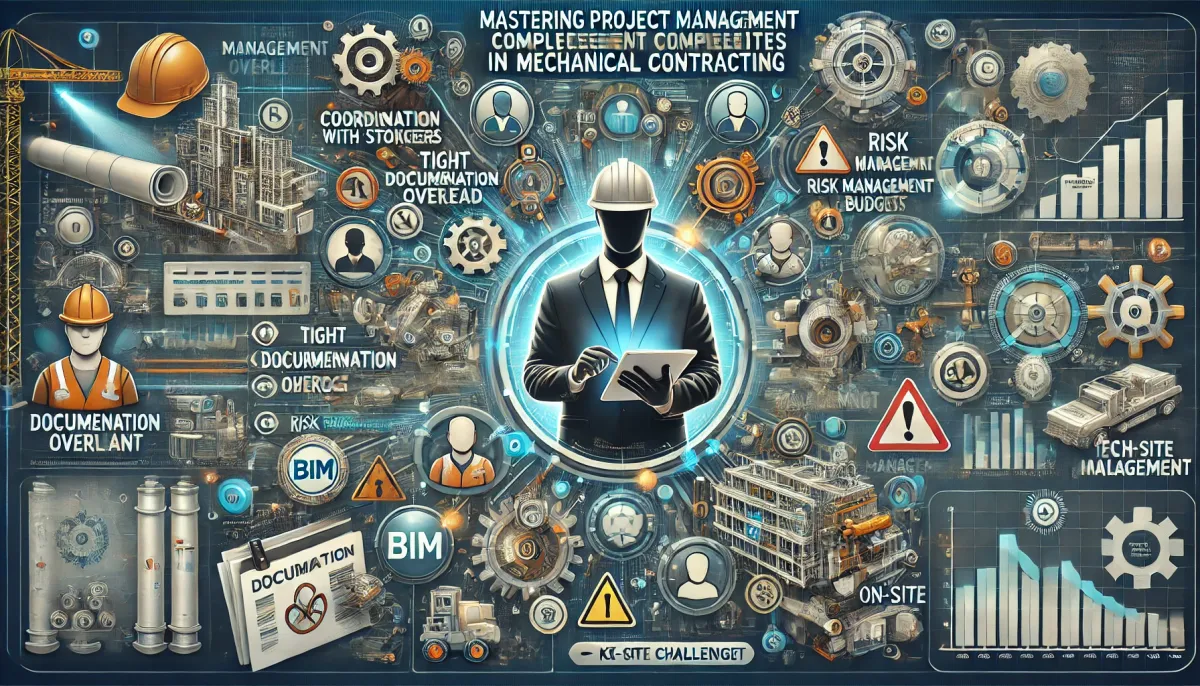
Mechanical contractors play a pivotal role in delivering critical building systems, such as HVAC, plumbing, and refrigeration, for commercial and industrial projects. However, managing these projects is no small feat. From coordinating with multiple stakeholders to navigating tight timelines and budgets, the complexities of project management are a daily challenge for contractors in this field.
The Core Challenges of Project Management
- Coordination with Multiple Stakeholders
Mechanical contractors often work alongside architects, engineers, general contractors, and other trade specialists. Ensuring clear communication and seamless collaboration among these parties is crucial but challenging. Misalignments or delays in one area can create ripple effects, affecting the entire project. - Documentation Overload
Construction projects generate vast amounts of documentation, including contracts, blueprints, permits, change orders, and progress reports. Managing this data effectively while ensuring compliance with regulations and client expectations is a significant administrative burden. - Tight Timelines and Budgets
Projects are frequently constrained by aggressive schedules and fixed budgets. Delays caused by labor shortages, material procurement issues, or unforeseen site conditions can lead to cost overruns and missed deadlines, straining relationships with clients. - Risk Management
Mechanical contractors face numerous risks, including safety concerns, equipment failures, and unanticipated site conditions. Proactively identifying and mitigating these risks is essential to maintaining project momentum and ensuring worker safety. - Technological Integration
Incorporating advanced technologies like Building Information Modeling (BIM) and project management software can streamline operations, but their implementation requires training and adaptation. Without proper integration, technology can become an additional challenge rather than a solution.
Strategies for Managing Project Complexities
- Effective Communication Channels
Clear communication is the cornerstone of successful project management. Regular meetings, progress updates, and centralized communication platforms ensure all stakeholders are aligned. Using tools like cloud-based project management software helps keep everyone informed in real time. - Adopting Project Management Software
Tools like Procore, MSuite, and other specialized platforms streamline scheduling, budgeting, and documentation. These tools provide real-time visibility into project progress and help contractors stay organized amidst complex workflows. - Building Strong Teams
Experienced project managers and skilled technicians are invaluable in handling the intricacies of mechanical contracting projects. Investing in workforce development and fostering a culture of collaboration can improve overall project execution. - Risk Assessment and Contingency Planning
Identifying potential risks early and developing contingency plans helps contractors respond effectively to unexpected challenges. Regular site assessments and safety audits are key to mitigating risks. - Leveraging Technology
Advanced tools like BIM and AR/VR enhance visualization and planning, allowing contractors to detect potential issues before construction begins. Prefabrication technologies also streamline on-site installation, reducing complexity and improving efficiency. - Focus on Lean Construction Practices
Lean principles emphasize reducing waste and improving efficiency. By applying these practices, contractors can optimize resource use, minimize delays, and enhance project outcomes.
The Importance of Collaboration
Collaboration is vital to overcoming project complexities. By fostering strong relationships with suppliers, general contractors, and clients, mechanical contractors can navigate challenges more effectively. Open communication and mutual trust help build partnerships that support successful project delivery.
Looking Ahead: The Future of Project Management
As the construction industry evolves, so too will the challenges of project management. Mechanical contractors must continue to adapt, leveraging emerging technologies and innovative practices to stay ahead. By focusing on efficiency, collaboration, and proactive planning, contractors can tackle even the most complex projects with confidence.
Managing project complexities may be demanding, but it is also an opportunity for contractors to demonstrate their expertise and deliver exceptional results. With the right tools, strategies, and mindset, mechanical contractors can ensure their projects are completed on time, within budget, and to the highest standards.
Let’s Keep Talking:
Jenny is a business insurance broker with Waypoint Insurance. She can be reached at 604-317-6755 or jhansen@waypoint.ca. Connect with Jenny on LinkedIn at https://www.linkedin.com/in/jenny-holly-hansen-365b691b/. Connect with Jenny at BlueSky: https://bsky.app/profile/jennyhollyhansen.bsky.social
Let’s Meet Up:
Jenny Holly Hansen is a cohost with Chris Sturges of the Langley Impact Networking Group. You are welcome to join us on Thursday’s from 4pm to 6pm at: Sidebar Bar and Grill: 100b - 20018 83A Avenue, Langley, BC V2Y 3R4
Tags: #Jenny Holly Hansen #Project Management #Mechanical Contractors #Risk Management #Contingency Planning #Strong Teams

